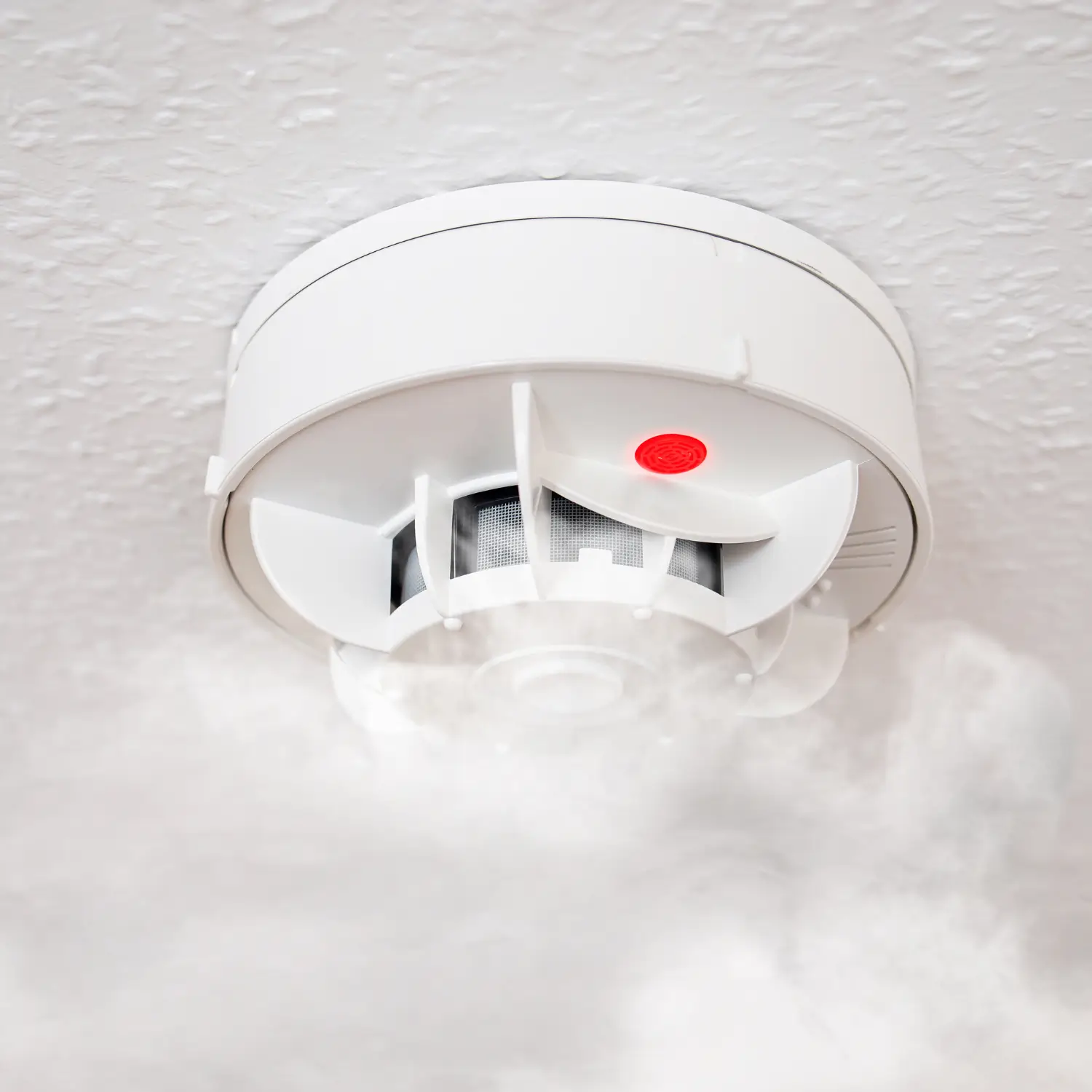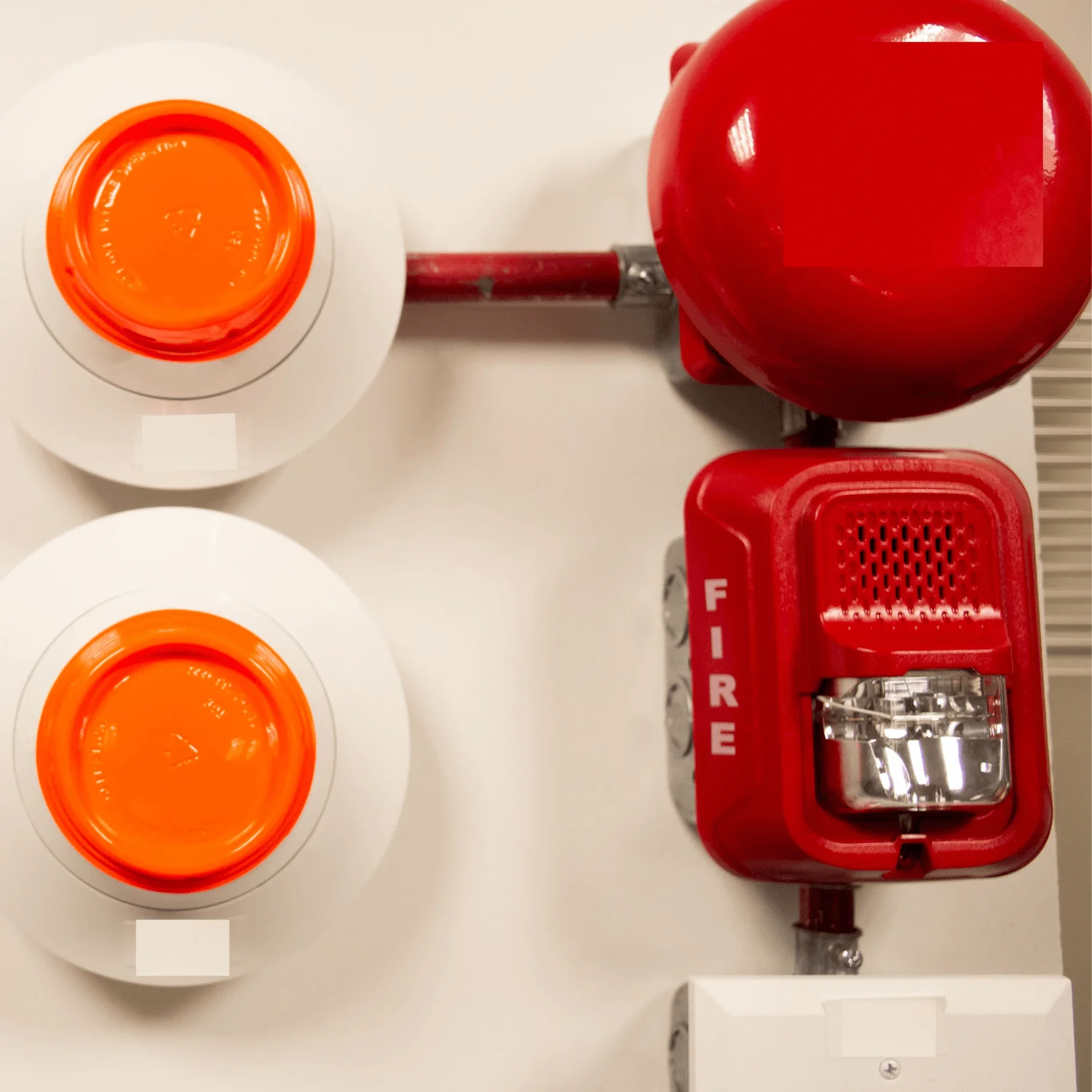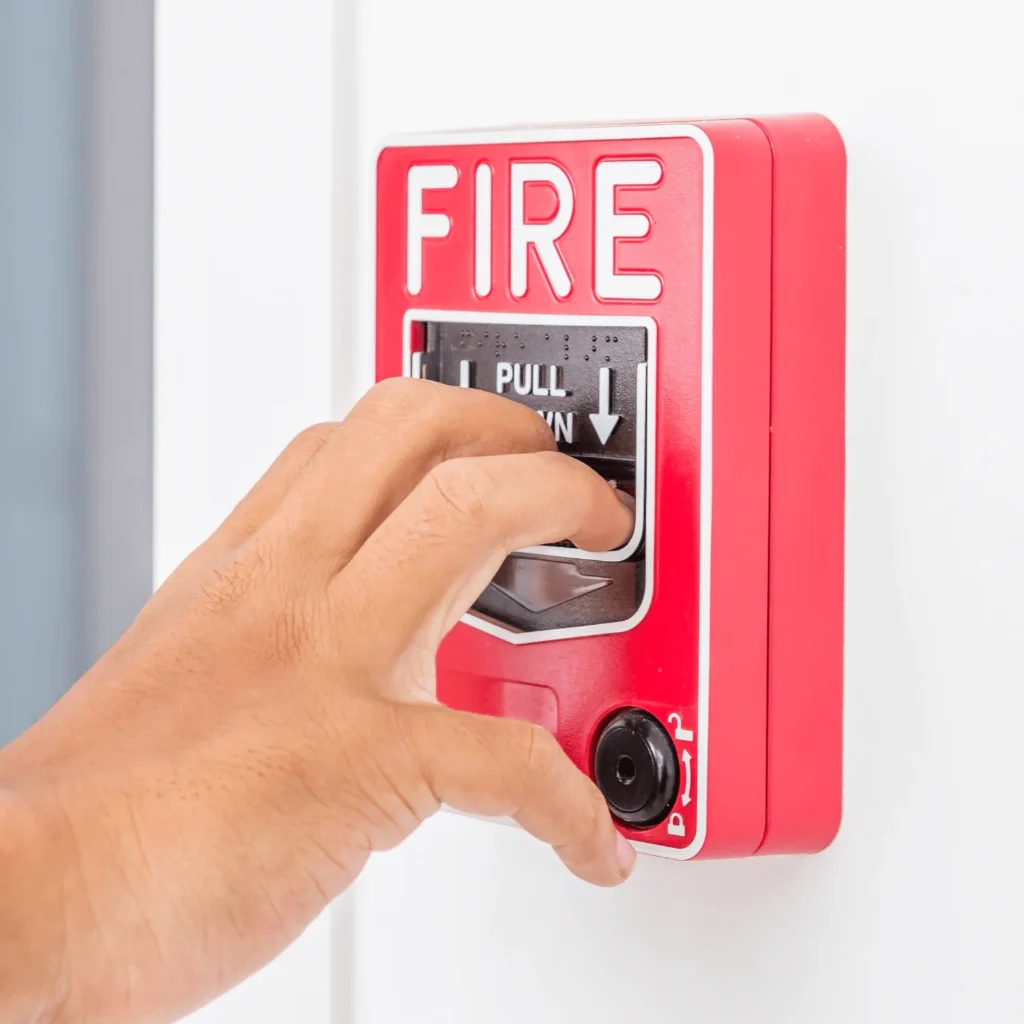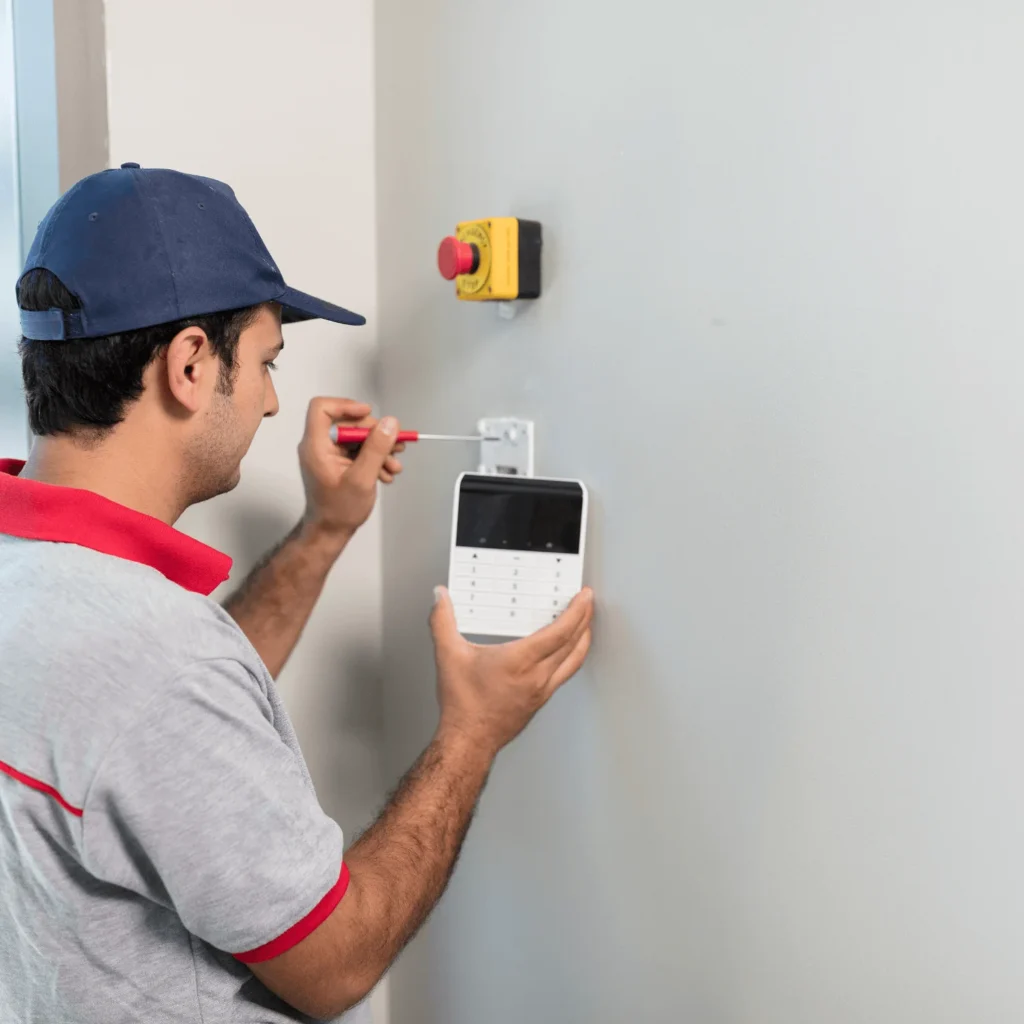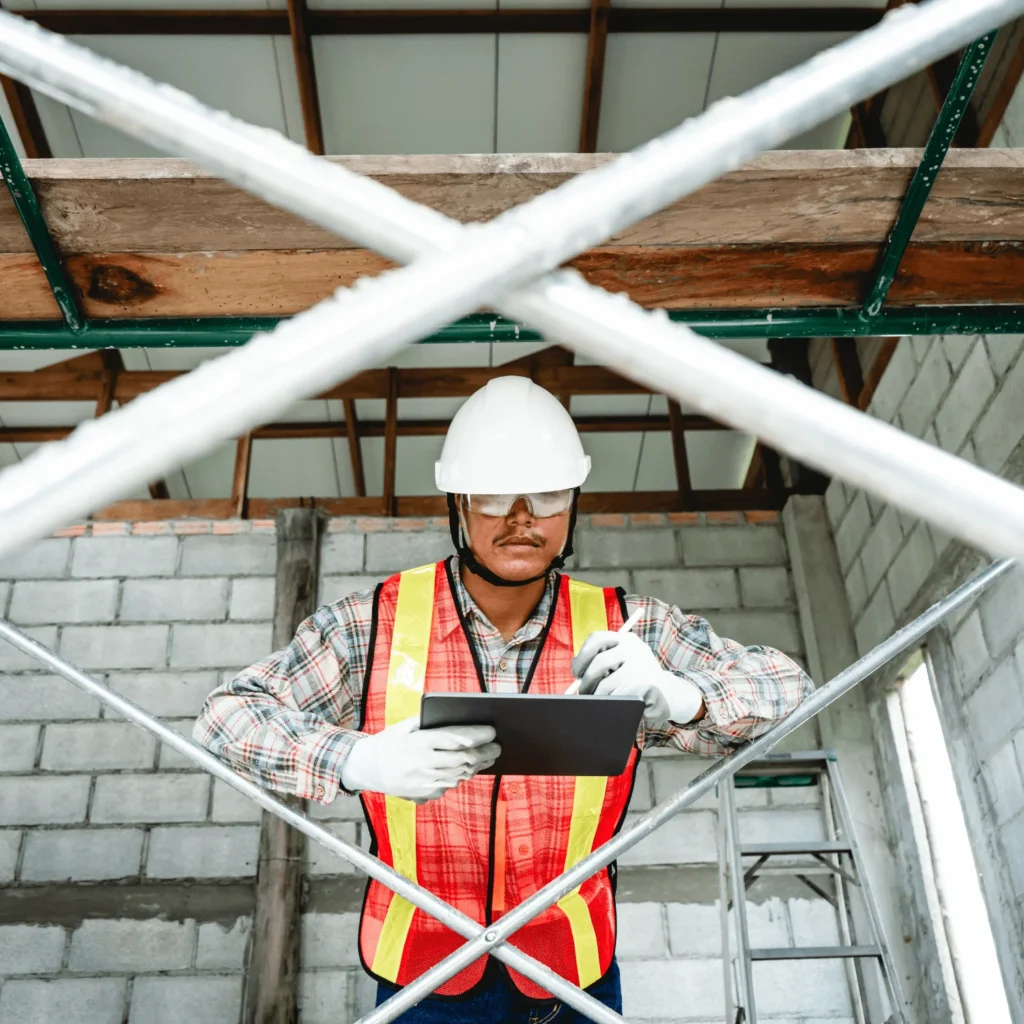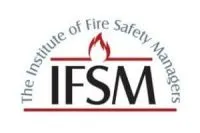Safeguarding East London with Expert Fire Alarm Solutions
Ensure your safety with a London Safety Certificate. Contact us today for dependable fire alarm services and experience peace of mind with our certified professionals.
ONLY £180
* All inclusive (No hidden Cost)
* Limited time offer upto 2 weeks from now
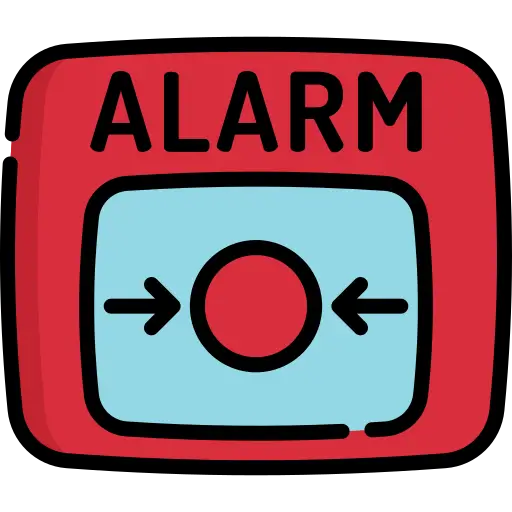
London Safety Certificate: Expert Fire Alarm Solutions in East London
In East London, you’ll find that having the right fire alarm system is crucial for meeting compliance standards and ensuring optimum safety. Whether it’s a conventional, addressable, or wireless system, each offers unique advantages tailored to your property’s size and complexity. You must consider system scalability and integration with other security systems to enhance emergency responses. Local legal requirements are stringent, necessitating regular audits and maintenance to keep your insurance valid and your property safe. Understanding these complex factors is key, as there’s much more to explore that could impact your decision on the best system for your needs.
London Safety Certificate specialises in providing top-tier fire alarm solutions across East London, ensuring the safety and compliance of various properties with over 12 years of expertise in the field. With a team of certified and highly trained technicians, they offer a comprehensive range of services from installation to maintenance and emergency repairs of fire alarms. Known for their reliability and responsiveness, they prioritise customer satisfaction, reflected in their 5-star reviews. Whether it’s a residential, commercial, or industrial setup, London Safety Certificate delivers competitive pricing, transparent quotes, and the peace of mind that comes with professional, trustworthy service in fire safety.
Fire Alarm Installation Price
£180
✔ IFSM Approved Contractor
✔ Accordance with BS5389
✔ Professional Installers
✔ 10 Years Experience

HOW CAN WE HELP
At London Safety Certificate, we provide top-tier fire alarm solutions across East London, ensuring that residential and commercial properties have reliable and responsive fire safety systems. Our commitment to being a trustworthy service provider means that we are dedicated to the safety and satisfaction of our customers. We offer comprehensive services, including installing, maintaining, and repairing advanced fire alarms tailored to meet each client’s needs and regulations. With our expertise in fire alarms, we empower our clients by enhancing their fire safety measures, helping to protect lives and property effectively.
Book Now
WHY US
When considering the safety and security of your premises in East London, choosing the ‘London Safety Certificate’ for your fire alarm needs is a decision that ensures peace of mind and reliability. With over 12 years of specialising in the fire safety industry, our team of certified and highly trained technicians is committed to delivering top-tier service. We are recognised for our responsiveness and trustworthiness, offering competitive pricing and transparent quotes to ensure no surprises. Our emergency services are readily available, ensuring we are there when you need us the most. Coupled with a track record of customer satisfaction and our 5-star reviews, ‘London Safety Certificate’ is a premier choice for dependable fire alarm solutions in East London.
Book NowUnderstanding Fire Alarm Basics
To effectively safeguard your property and ensure safety compliance, it’s essential to grasp the fundamentals of fire alarm systems. Delving into fire alarm history, the evolution from rudimentary alarm bells to sophisticated networked systems highlights the strides in safety technology.
Modern smoke detectors, pivotal for early detection, function by identifying smoke particles through either ionisation or photoelectric sensors, significantly reducing alarm response time.
Understanding residential compliance standards is crucial. These standards ensure that alarms meet specific criteria for effectiveness and reliability, directly impacting residential fire statistics by mitigating potential fire damage and loss of life.
Alarm signal types, including auditory and visual alerts, are designed to accommodate various building layouts and resident needs, ensuring everyone can promptly respond during emergencies.
Moreover, you must debunk fire alarm myths that can undermine fire safety education. For instance, many believe smoke detectors are excessively sensitive to common household smoke from cooking; however, today’s devices are finely tuned to differentiate between smoke types.
Incorporating fire prevention tips into daily routines, such as regularly testing fire alarms and adhering to emergency evacuation plans, significantly enhances your preparedness. These plans should be practised routinely and adjusted to include all residents, particularly children and those with mobility challenges.
Lastly, pay attention to the importance of ongoing fire safety education. It reinforces the practical knowledge needed to react swiftly and correctly to fire, turning theoretical preparation into lifesaving action.
Understanding these elements ensures compliance and profoundly elevates your safety measures at home.
Book NowTypes of Fire Alarms Available
Having covered the basics of fire alarms and their importance in maintaining safety, let’s now explore the various fire alarms available to protect your home or business. You’ll find that the breadth of options allows tailored solutions for every need.

Conventional Alarms
These systems are divided into zones, simplifying location identification but not pinpointing exact spots. They are ideal for smaller setups.
Book Now
Addressable Systems
Each device has a unique identifier, enabling precise location detection, which is crucial for larger premises.

Wireless Systems
These provide flexibility and ease of installation without the need for extensive wiring. They integrate seamlessly with smart technology.
Book Now
Multi-Sensor Units
These combine smoke detectors, heat sensors, and sometimes carbon monoxide detection, offering comprehensive protection.
Book NowUnderstanding each type’s mechanism and suitability is crucial in your selection process. Conventional alarms are cost-effective and typically used in smaller or less complex environments. If you’re handling a larger area, like a commercial space, addressable systems are more appropriate due to their detailed monitoring capabilities.
Wireless systems are ideal for environments where wiring poses a challenge or aesthetic integrity must be maintained. They also support integration with smart technology, allowing you to monitor and control settings remotely.
Lastly, multisensor units are particularly efficient. By detecting various dangers, they reduce false alarms and increase detection speed, which is crucial in emergencies. These units ensure you’re covered on all fronts, whether smoke, heat, or carbon monoxide.
Each type of fire alarm system offers unique benefits. Your choice should align with your property’s specific needs and compliance requirements, ensuring maximum protection and safety.
Key Features to Consider
Before selecting a fire alarm system, consider key features that align with your safety goals and regulatory requirements. You must be equipped with the most effective components for detecting and alerting in emergencies. As you evaluate your options, here are three primary features to consider:
Type and Sensitivity of Fire Alarm Sensors
Fire alarm sensors are pivotal in early detection and significantly influence emergency response times. Opt for a mix of ionisation and photoelectric smoke detectors to cover a range of fire types, from fast-flaming to smouldering fires.Additionally, consider installing heat detectors in areas where smoke detectors are less effective, such as kitchens or high-dust environments.
Integration of Notification Devices
Effective communication in an emergency is vital. Your system should include various notification devices, such as auditory alarms (like horns and bells) and visual indicators (like strobe lights), especially in high-noise areas or spaces designed for deaf people.The configuration of these devices should comply with the latest installation standards and safety regulations to ensure maximum coverage and audibility.
System Scalability and Interconnectivity
Whether outfitting a small residential building or a large commercial facility, consider the scalability of alarm systems. A modular system that can be easily expanded or integrated with other security systems will provide flexibility as your needs evolve. Furthermore, systems that offer remote monitoring capabilities can enhance your emergency response strategy by ensuring that fire safety officials are alerted immediately.
Choosing the right combination of these features will meet safety regulations and ensure a robust defence against fire risks on your property.
Legal Requirements in East London
After considering the key features of your fire alarm system, you must also ensure compliance with the specific legal requirements in East London. Understanding and adhering to these regulations isn’t just about following the law; it’s about ensuring safety and minimising liability.
In East London, fire safety regulations are stringent. You’re required to comply with national building codes, which are rigorously enforced by local authorities. These codes dictate everything from the type of fire alarm systems you can install to the necessary emergency procedures you must have in place. You must conduct detailed risk assessments tailored to your property’s occupancy classifications. This ensures that your fire alarm system adequately covers all potential risks for your building’s use.
Insurance requirements also play a significant role. Failure to meet these can lead to legal repercussions and a denial of fire damage claims. Regular compliance audits by certified professionals should be a key component of your fire safety strategy to maintain insurance validity.
For your convenience, below is a table summarising key legal aspects you need to consider:
Maintaining compliance with these aspects is imperative. Remember to consider the complexity of legal compliance; consider engaging a fire safety expert to navigate these waters effectively.
Choosing the Right Fire Alarm
Selecting the ideal fire alarm system is crucial for your safety and compliance with East London’s stringent legal standards. You must consider several key aspects to ensure your choice meets legal requirements and suits your specific environment and usage needs.
Firstly, understanding different fire alarm types is essential. Options range from conventional systems suitable for small premises to more complex addressable systems designed for larger spaces with higher risk factors. Each type has pros and cons, particularly concerning installation costs and system upgrades.
Smoke detector placement is another critical factor. Strategic placement is vital to detect smoke at the earliest possible stage. This involves detailed planning to ensure all critical areas are covered without oversaturation, which can lead to false alarms.
Wireless systems might be best for a business or large residential building. They offer ease of installation and minimal disruption, which can be crucial in operational business environments. However, always consider the battery life of wireless units to maintain functionality during power outages.
Moreover, you must pay attention to alarm monitoring and emergency protocols. These systems ensure that the fire department is alerted immediately in the event of a fire, potentially saving lives and property.
Evaluate your property’s layout and fire risk to determine the appropriate fire alarm type. Ensure the system is compliant with the latest code compliance regulations. Plan for regular user training and system maintenance to ensure ongoing effectiveness.
Maintenance and Testing Tips
Regular maintenance and testing are essential to ensure your fire alarm system remains in optimal working condition. You’ll need to adhere to a rigorous schedule that covers all critical aspects of your system’s functionality. Here’s how you can master the upkeep of your fire safety measures:
Regular Inspections and Battery Replacement
Monthly inspections are conducted to check alarm components’ physical and functional state, including smoke detectors and manual call points. Battery replacement should be part of these checks, ensuring no power failures could render the smoke detectors useless. It’s not just about changing batteries when they fail; it’s about proactive replacement to guarantee functionality.
Testing for Alarm Sensitivity and System Upgrades
Testing alarm sensitivity quarterly ensures that your detectors are neither too sensitive, causing false alarms, nor under-sensitive, which could miss actual fire occurrences. Consider system upgrades annually to incorporate the latest technology, enhancing your system’s reliability and compliance with the latest safety standards.
Comprehensive Maintenance Contracts and User Training
Secure a maintenance contract with a reputable provider offering detailed service and rapid response times. These contracts often include emergency support, which is crucial for immediate needs. Additionally, conduct bi-annual user training sessions. These are vital for ensuring that everyone knows how to respond during a fire drill and understands the basics of response planning, reinforcing the role of human elements in fire safety.
Installation Process Explained
Once you’ve chosen the right fire alarm system for your East London property, installing it becomes the next crucial step. Understanding the installation steps in detail ensures that your system functions optimally, safeguarding your premises against fire hazards.
Start by consulting with certified installation professionals well-versed in local installation regulations. These regulations ensure that the system’s setup meets legal and safety standards. It’s not just about compliance; it’s about ensuring your property’s and its occupants’ safety.
The installation timeline can vary, typically from a few hours to several days, depending on the complexity and size of your system. Installation costs vary based on these factors, so getting a detailed quote is essential.
Be prepared for potential installation challenges, such as structural impediments or electrical issues, which competent professionals can navigate with expertise.
Installation locations should be strategically chosen to maximise the alarm’s effectiveness. This includes placing detectors in high-risk areas such as kitchens, hallways, and electrical equipment. Each location must be accessible for maintenance while ensuring optimal function.
The use of appropriate installation tools is critical. Each tool, from circuit testers to drills and specialised sensors, is pivotal in a secure and efficient installation.
Adhering to installation safety practices is non-negotiable. This includes disconnecting power during the setup and testing alarms post-installation to ensure they’re operational.
Book nowImpact of Technology on Fire Safety
Advancements in technology have significantly enhanced fire safety measures, making today’s systems more efficient and responsive than ever before. As you delve into modern fire safety, you’ll find that the integration of cutting-edge technologies not only streamlines operations but also elevates the overall security framework of any establishment.
Here are three key technological innovations that have revolutionised fire safety:
This responsive technology integration ensures that you and the fire safety professionals are always one step ahead.
These technological enhancements ensure compliance with safety standards and empower you with tools that protect lives and property more effectively than ever.
Through wireless technology, data privacy measures, and advanced user interfaces, fire safety systems are compliant and pioneers in technological innovation within safety protocols.
Local Fire Alarm Resources and Services
Are you looking for reliable fire alarm resources and services in East London? Understanding the local landscape can enhance emergency preparedness and ensure compliance with local regulations. It’s crucial to access expert-driven guidance that focuses on your safety and aligns with community standards.
East London boasts a variety of fire safety services, from advanced alarm system upgrades to comprehensive safety training programs. Equipment suppliers in the area offer the latest in fire prevention technology, ensuring you have access to top-tier tools for safeguarding your premises.
For those concerned with ongoing safety management, local alarm monitoring services constantly supervise your fire alarm systems, alerting you immediately in the event of a fire. This service is essential for maintaining a rapid response capability and minimising damage and potential loss.
Insurance considerations should be noticed. Partnering with insurers who understand the specifics of fire safety compliance can save you from costly penalties and facilitate smoother claim processes in case of fire-related incidents.
Below is a table summarising key local resources and services that you should consider:

Alarm System
Upgrades
Latest technology installations for enhanced.
[Local Tech Solutions]

Safety Training
Programs
Comprehensive training for emergency scenarios.[East London Safety HQ]

Alarm
Monitoring
24/7 monitoring services to ensure timely alerts.[SecureWatch Alarms]

Insurance
Agencies
Specialised in fire safety compliance and claims.[InsureSafe Brokers]
Leverage these resources to improve your fire safety strategy, ensuring you’re prepared and protected according to the highest standards.
Fire Safety Compliance in London
In the bustling metropolis of London, maintaining fire safety compliance is not just a regulatory requirement but a critical responsibility for every property owner. Integrating advanced fire alarms and detection systems is pivotal in safeguarding lives and properties. Fire Alarms London is dedicated to ensuring that all installations meet and exceed the rigorous standards set by UK fire safety legislation. This commitment is crucial in a city where the density of historic and contemporary architecture coexists, each with its unique fire safety challenges.
Fire safety compliance involves a comprehensive approach, beginning with the initial assessment of the premises to identify specific risks associated with the property’s use, occupancy, and structural design. For businesses and residential buildings throughout London, this means adopting a tailored strategy that addresses potential hazards with precision and foresight. Fire Alarms London excels in deploying cutting-edge technology and solutions, including smoke detectors, heat sensors, and mass notification systems, all designed to provide early warning and ample time for evacuation during a fire.
Furthermore, Fire Alarms London ensures that all systems are meticulously maintained and regularly inspected to comply with The Regulatory Reform (Fire Safety) Order 2005. This involves the technical servicing of alarms and educating property owners and occupants on proper maintenance practices and emergency procedures. This educational aspect is vital, as informed individuals are better prepared to act swiftly and effectively, minimising the impact of a fire. Through dedicated service and expertise, Fire Alarms London helps create safer living and working environments across the city, reinforcing the importance of compliance as a cornerstone of community safety.
FAQs
When installing fire alarms in historical buildings, consider preservation standards and heritage protection guidelines. Architectural challenges may require creative solutions to make safety measures meet regulations. Trust experts for compliant installation.
Fire alarm systems can be installed in various properties, including industrial, high-rise buildings, retail spaces, office buildings, and educational institutions. To ensure safety, ensure compliance with regulations and hire qualified professionals.
To guarantee your fire alarm system’s efficiency post-installation, conduct routine inspections and test procedures, monitor alarm sensitivity, replace batteries regularly, and practice emergency response drills. These maintenance tasks are crucial for the system’s reliability and effectiveness.
You can enhance home safety by integrating fire alarm systems with other security measures. Incorporate home automation for seamless surveillance. Utilise technology for emergency response and monitoring. Confirm compliance with building codes for thorough security.
Could you confirm compatibility with system requirements when considering fire alarm installation for buildings with unique layouts or structures? Address installation challenges due to building complexity. Adhere to safety regulations for proper placement and functionality of alarms.


